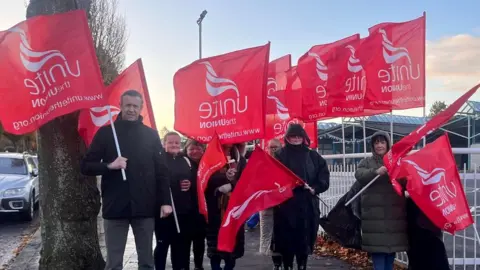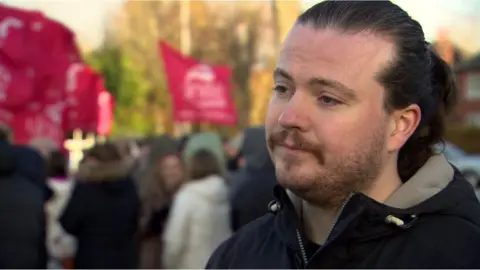School strike: Major disruption caused as staff take action over pay
 BBC
BBCSchool support staff feel they have been "pushed to the side", a classroom assistant taking part in a 48-hour strike over pay and grading has said.
Among 800 Unite members taking part in the action are bus drivers, classroom assistants, cooks and clerical staff.
Mathew Kirkpatrick said staff feel they are "not appreciated".
The Department of Education said there is no budget available for proposed pay increases.
"Everything is going up, bar our wages," Mr Kirkpatrick said.
"Every time I go and do a grocery shop everything's going up my rent has gone up 10% so why can't our wages go up to the same value?"
Mr Kirkpatrick, who works at Glenveagh School in south Belfast, said workers do not want to strike but "just want to be fairly compensated".
"It's a job we love doing, it's not a job, it's a vocation," he added.

In east Belfast, Unite members picketed outside Mitchell House School.
Among them were classroom assistants Michelle Stewart and Diana Fox.
Ms Fox told BBC News NI: "We're carers and it's doesn't pay to be a carer anymore. I worry about what's going to happen to these children in the future."
Unison and GMB members employed by the Education Authority (EA) will walk out for the full day on Thursday, while Nipsa members will strike for two hours after the start of their shifts.
Unite said responsibility for the industrial action lies with the Department of Education (DE) for what it described as "obstructive behaviour".
Unite general secretary Sharon Graham said it was unacceptable that the DE continued "to renege on the implementation of a pay and grading review that has been negotiated by the Education Authority with Unite".
"As a matter of urgency, the Education Authority must secure the necessary funding to avoid further escalation of strike action in Northern Ireland's education sector," she added.
Speaking from the picket to BBC News NI, classroom assistant Victoria Brown, who also works at Glenveagh School said she would rather not be on strike but had no choice.

"I feel for the parents knowing that it's going to be a big disruption because a lot of the children are very routine-based and expect to be coming to school today," she said.
"I understand parents are going to be having it tough but we are having it tough as well."
Desmond Milne, a senior driver with the Education Authority's special needs transport service said that within the transport industry in Northern Ireland, special needs drivers are among the lowest paid in the country.
He said this is particularly jarring "when you take into consideration the responsibility our drivers have and the level of training and qualifications they have to get before they actually get in behind the wheel of a special needs bus".
"It's the last thing unite members every wanted to do because at the end of the day there's no winners in strikes," he said.
Biggest strike in years
The strike began at 00:01 GMT on Wednesday and is due to run until midnight on Thursday.
On Thursday, school staff from Unison, GMB and Nipsa will join the strike.
Unions said it would be one of the biggest strikes among non-teaching unions in years.

At least four special schools are closed to pupils as a result of the strike action.
Glenveagh, Mitchell House, Park and Oakwood schools in Belfast all said they were closed to pupils on both Wednesday and Thursday, while Rossmar School in Limavady said its primary department was open on Wednesday while its secondary department was closed to pupils.
The school added that both departments would be closed to pupils on Thursday.
Translink school services were not affected by the strike.
'Mitigate the impact'
The Education Authority said steps had been taken to identify the potential impact of the action on schools and services.
"We are taking steps to mitigate the impact of the action; however, due to the large number of staff anticipated to be involved in the planned action, we are expecting significant disruption," a spokesperson said.
Last week, the DE said it was continuing to engage with the EA on the content of the pay and grading business case to "ensure the proposals are fully justified and affordable".
A spokesperson added that the proposal put forward by the EA and trade unions has a significant cost associated with it.
The initial annual implementation cost for the EA would be £39m, with the subsequent recurring cost rising to £71m after three years, the department said.
"This would be in addition to any National Joint Council pay rise each year.
"However, there is currently no budget available to implement this without further funding being made available."
